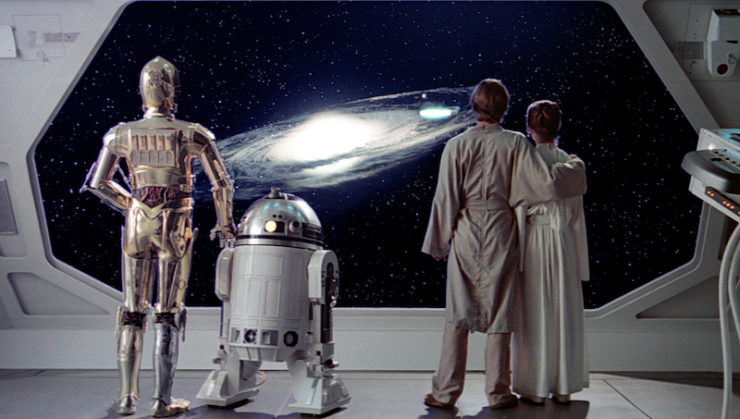“[L]et’s be honest: we never had Star Wars,” Amberlough author Lara Elena Donnelly writes on Unbound Worlds. “We had all the ephemera that unfurled from the ineffable magic of those first three films. Star Wars was—and remains—critically important in nerdy millennial circles. It’s a touchstone by which we immediately recognize our people. It’s a way of connecting with older generations, including our parents, and newbie nerds like our younger siblings, our students, and our children. But it was never ours.”
Until, that is, she saw The Force Awakens in theaters two years ago.
Despite fond memories of watching the rereleased original trilogy as a young’un, it wasn’t until she was sitting in the theater watching a Star Wars movie no one else had ever seen that she felt real ownership of the universe: “When I saw The Force Awakens, in a packed theatre at midnight, crammed into the front row with my neck craned skyward, I felt what I’m pretty sure all those nerds must have felt in 1977 when Star Wars first hit the big screen. I felt surges of joy and terror, excitement to seek out worlds beyond this one, a renewed drive to challenge evil with empathy.”
Donnelly’s essay is one of 20, part of Unbound Worlds’ A Long Time Ago series. Every weekday in October, a different author shares what Star Wars means to them, from how it affected them as a writer (at least one has gone on to write a Star Wars book!) to more personal affirmations.
Before she wrote the Murderbot Diaries, Martha Wells got to play in a galaxy far, far away with Star Wars: Razor’s Edge, a Legends tale that pits Princess Leia against Alderaanian pirates. But first, her 13-year-old self needed to realize that there were other SFF fans out there:
I was an isolated kid in a lot of ways, and didn’t know anybody else who really liked SF as much as I did. And I’d been told over and over again that liking SF/F, or liking anything involving books and media so intensely, was weird and strange and probably bad, or if not bad, something that made me a figure of ridicule. It was especially bad for a girl to like those things, but I was sure to get over it when I grew up and stopping being silly. I knew I wasn’t the only one, I knew there were other people like me out there; all these books and comics had been written by people, for people. But before Star Wars, it was hard to believe those people really existed.
Mapping the Interior author Stephen Graham Jones talks about “capturing” narratives and characters that speak to him, and thanks Star Wars for giving him “Indian role models” and “Indian heroes” while growing up:
And Leia, with her Hopi hairdo, her homeland isn’t just taken from her, it’s turned to (space)rubble. But that just makes her fight harder. Luke, he’s been adopted out of his tribe, has been forced into (space)farming, but is always looking up to the sky for home. Is there a more Indian name than Skywalker? Maybe: Han Solo, that living embodiment of an Indian who is not going to wait to get his request to cross the reservation line approved. He just hits that hyperspace button and goes. And, like all Indians, he believes in Bigfoot. He has to: Bigfoot’s his copilot. And don’t forget Luke and Leia being twins. So many of the tribes have stories about twins either messing up or saving the world—sometimes both. It’s what they do.
And Bradley P. Beaulieu, co-author of The Burning Light, reminds us how the Star Wars universe is full of contrasts:
Now that I’m older, I can appreciate more. Like inclusivity. Here we have this vast array of characters with wildly diverse backgrounds, and yet they treat each other like … people. Just simple people, divorced from their species, their races, their religions, their sexes, and so on. Yes, some biases crept into the story (it’s impossible to be completely divorced from such things), but I always felt as though the story was rooted less in inherited bias than it was on other stuff. Like personalities: Luke’s callow impatience vs. Yoda’s initial feigned curiosity, for example. Or ideology, as in the case of the Empire as it fought to root out and defeat the Rebels. Or base commerce, as in the case of Han and Greedo, or Han and Jabba, or Han and Lando, or… well, again, you get the idea.
Unbound Worlds will continue to release new essays through the end of October, with pieces from Max Gladstone, Fran Wilde, and more coming up!










